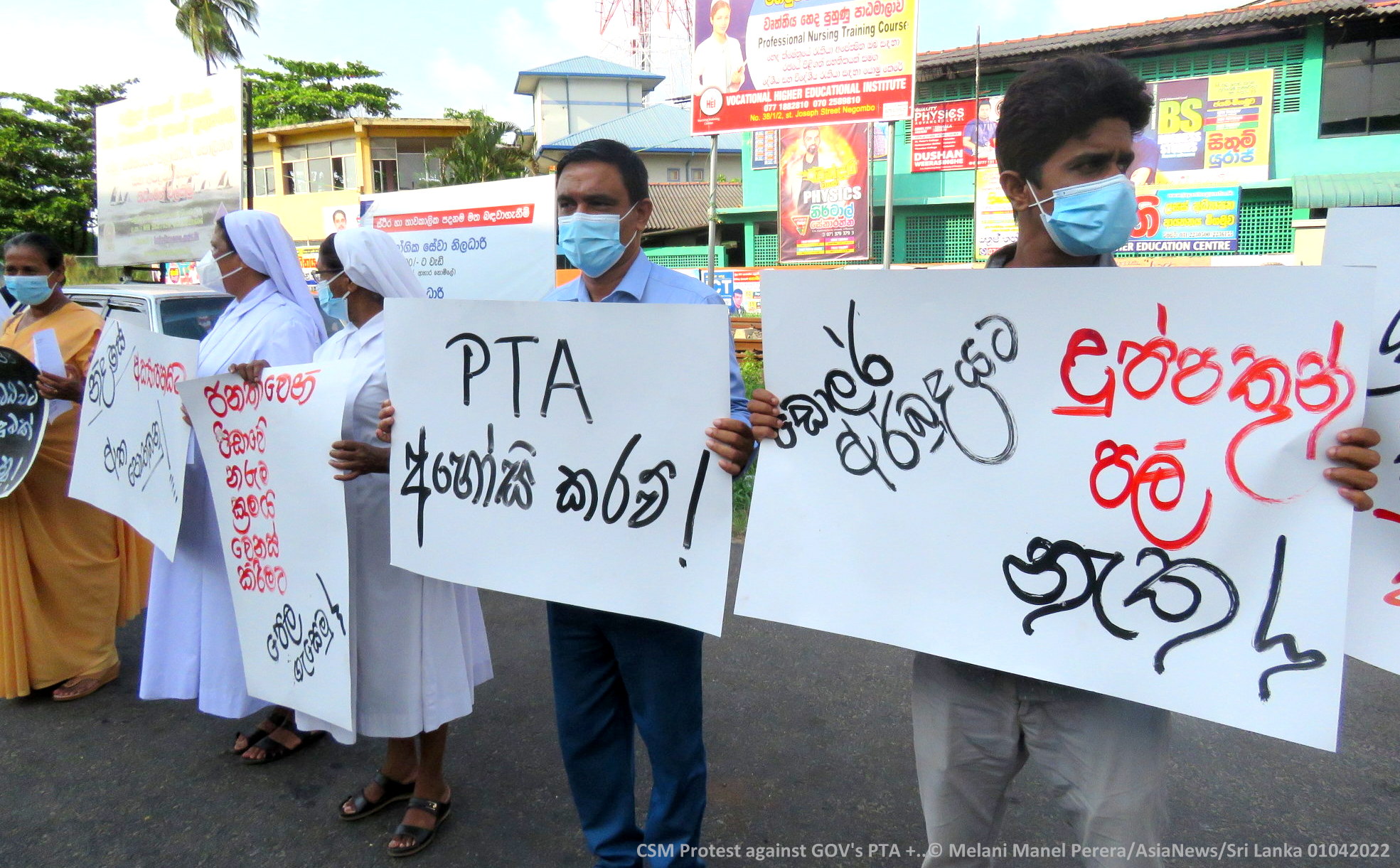Sri Lanka’s civil society groups want the Prevention of Terrorism Act (PTA) repealed
Several civil society groups have presented an appeal to the Ministry of Justice after it announced new legislation. They want the government to immediately and unconditionally scrap the existing law. But for Justice Minister Nanayakkara, it is “essential”. Adopted in 1982, the PTA has been used to silence critical voices and oppress minorities, such as Tamils and Muslims. Critics demand that ordinary, not special laws, be used, and that those convicted be provided compensation as well as physical and mental health care.
Colombo (AsiaNews) – In a joint appeal, more than 240 civil society actors – representing trade unions, lawyers, clergy, academics and former prisoners – are calling for the immediate and unconditional repeal of Sri Lanka's controversial Prevention of Terrorism Act (PTA), which has been in place since 1982.
A letter was delivered to the Secretary of the Ministry of Justice and National Integration and several groups discussed the matter with the minister. The letter firmly rejects the government's proposals to implement new anti-terrorism legislation as an alternative.
The appeal follows an announcement on 16 May, which gave citizens just two weeks to submit feedback on repealing the current PTA and drafting new anti-terrorism legislation.
“The committee is not representative of key interests – it includes largely state officials, military and Ministry of Defence personnel, and does not include victims and victims’ families, or Tamil or Muslim community representation,” the letter reads.
The signatories urge the Minister of Justice to fully assess the widespread loss of life caused by the PTA, which affects mainly the Tamil and Muslim communities, but also southern youth during the 1988/1989 uprising, as well as student leaders of recent grassroots movements.
Organisations like Amnesty have described the law as “draconian”, used to target and harass minorities, activists and journalists. The harm caused by the PTA to Sri Lanka’s political culture is “irremediable”, the appeal notes, because it is used primarily “to protect the authoritarian interests of the state.”
In 2022, the Sri Lanka Human Rights Commission also described the PTA as fundamentally incompatible with the rule of law, arguing that the anti-terrorism law need not be replaced. In fact, Sri Lanka already has a robust legal framework to address terrorist threats.
“This includes at least 15 laws and provisions under the Penal Code, as well as specialised agencies such as the Counter-Terrorism Investigation Division (CTID), National Intelligence Service (NIS), and the Financial Intelligence Unit (FIU) of the Central Bank," it said.
The appeal concludes with five key recommendations.
The first calls on the government to immediately repeal the Prevention of Terrorism Act No. 49 of 1979 (PTA), and impose a moratorium on its application until it is repealed.
The regular criminal justice system should be relied upon, which would make the use of a special terrorism law futile.
The third calls for assurance that no laws are enacted that authorise the authorities to limit freedom of movement, conducting meetings, holding rallies or marches, or making demands through any form of protest.
The fourth recommendation is to take measures to expedite justice for all those currently detained under the PTA, through political and legal interventions, including presidential pardon.
The last recommendation is to ensure reparations by the state for those detained under the PTA and not convicted – including an apology, compensation, the provision of physical and mental health care, as well as livelihood support.
The appeal was launched by the People's Council Movement, which emerged in the wake of Aragalaya (struggle), a popular uprising that ousted then President Gotabaya Rajapaksa and his government in 2022.
The Law & Society Trust (LST), a non-profit organisation, also officially submitted its recommendations to the Ministry of Justice. “It’s time to dismantle oppressive laws and rebuild with dignity, fairness, and accountability," it said.
The National Shoora Council (NSC) also urged Sri Lankan President Anura Kumara Dissanayake to honour his election pledges by repealing the PTA without replacing it with a new anti-terrorism law.
The Jaffna Bar Association echoed these calls, insisting at a meeting on 20 May that the PTA should be repealed immediately. It noted that the existing Criminal Procedure Code provides sufficient tools to address criminal matters and ensure public safety, making any new law unnecessary.
However, Minister Harshana Nanayakkara reiterated the government's position that it will ensure that this type of legislation is maintained. “This bill is not being prepared to be used for suppression on the grounds of racism, religion, or any other issue. Such a bill is essential in facing global terrorist challenges,” he said.
24/01/2007







.png)










